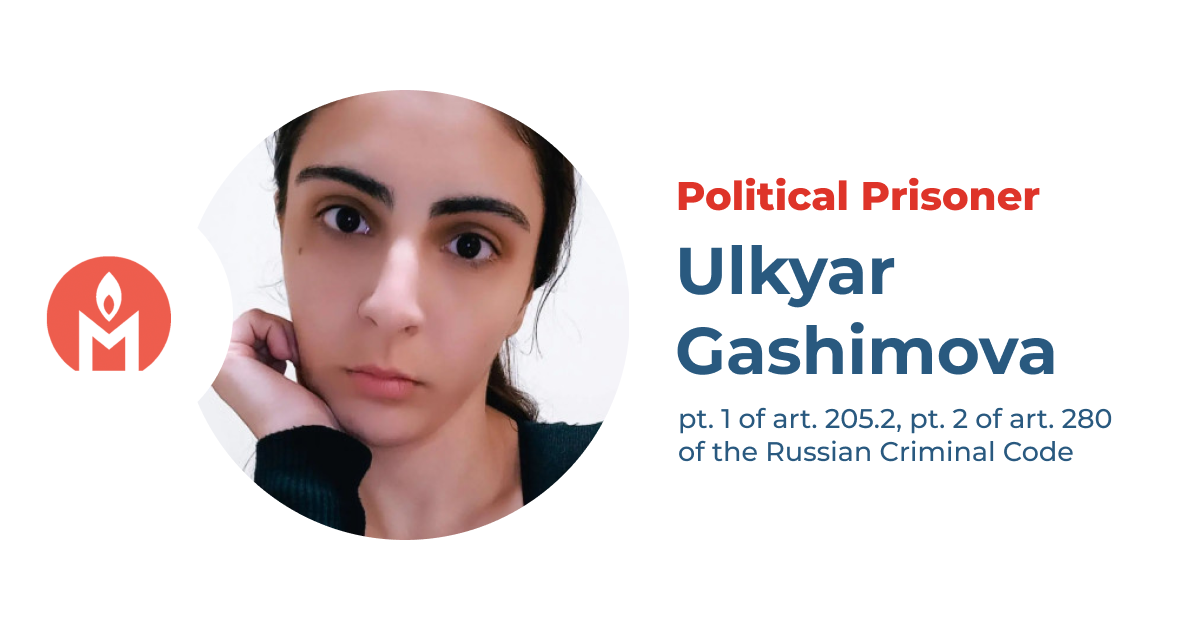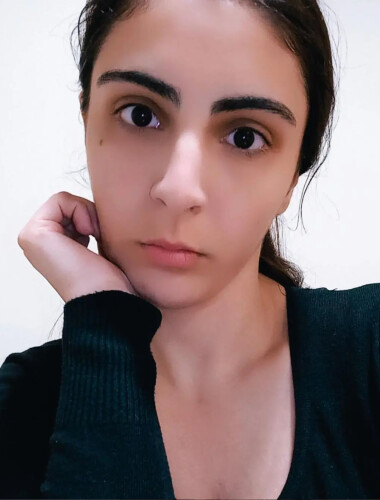Ulkyar Gashimova is a political prisoner
A resident of Dagestan has been sentenced to four and a half years in a penal colony for comments on Telegram against the Russian authorities and in support of Ukraine
The ‘Political Prisoners. Memorial’ human rights project, in accordance with international standards, considers Ulkyar Gashimova a political prisoner. Gashimova was convicted on a charge of making public calls to engage in terrorism and extremism on the internet for comments supporting Ukraine and against the Russian authorities. We demand that the verdict against Gashimova be quashed, that she be released, that the charge of making calls to engage in extremism be dropped, and that the charge of making calls to engage in terrorism be reviewed in a fair trial.

What were the charges against Ulkyar Gashimova?
Ulkyar Gashimova, a resident of Derbent who opposed the Russian invasion of Ukraine, was arrested on 2 May 2023 at Moscow’s Sheremetyevo Airport. She was on her way to visit her boyfriend, Anton Kolomitsyn, who received political asylum in the Netherlands. Initially, Gashimova was sentenced to two consecutive administrative-law jail terms on fabricated charges and then transferred to Dagestan, where she was remanded in custody on criminal charges.
Gashimova was accused of posting several comments in Telegram chats. In late December 2022, according to the investigative authorities, she allegedly wrote on the channel Belgorod-Podonnya the statements ‘Military recruitment offices should be blown up’ and ‘The same applies to local government, the prosecutor’s office and the police.’ These statements were classified by the investigative authorities as public online calls to engage in terrorism (Article 205.2, Part 2 of the Russian Criminal Code).
In February 2023, Gashimova allegedly posted a comment in another chat containing slogans such as ‘Glory to Ukraine’ and ‘Death to Russian fascists.’ The investigative authorities considered these statements to be online calls to engage in extremism on the internet (Article 280, Part 2).
In October 2024, Gashimova was sentenced to four years and six months in a general regime penal colony.
Why do we consider Ulkyar Gashimova a political prisoner?
We believe Gashimova was prosecuted for statements in support of Ukraine. While it is possible to interpret her words about blowing up military recruitment offices and other government buildings as calls for violence, the court failed to consider the context and did not take into account the fact that, in reality, these statements did not pose a significant danger to society. Gashimova made these comments because of the war of aggression Russia launched against Ukraine. This war has resulted in the deaths of hundreds of thousands of people, and hundreds of cities and villages have been destroyed. However, the prosecution did not provide any evidence that Gashimova’s words led to, or could lead to, any criminal actions. Her comments were likely seen by only a few hundred people, and she is not a public figure with the ability to influence a large audience.
Similarly, the court did not consider the context or assess the public danger of the comment ‘Death to Russian fascists,’ attributed to Gashimova. We view this statement not as a call to action but as a slogan expressing a desire to see Russia defeated. We believe such a statement does not justify prosecution under extremism laws.
In Russian judicial practice, anti-war statements of this kind are punished with real terms of imprisonment. Meanwhile, calls for violence spread by pro-government Russian media go unpunished. Such selective prosecution and disproportionate punishment demonstrate the political nature of Gashimova’s criminal prosecution.
A detailed description of Ulkyar Gashimova’s case and of our position is available on our website.
Recognition of an individual as a political prisoner does not imply the ‘Political Prisoners. Memorial’ human rights project agrees with or approves of their views, statements, or actions.
How can you help?
You can donate to help all political prisoners in Russia.
